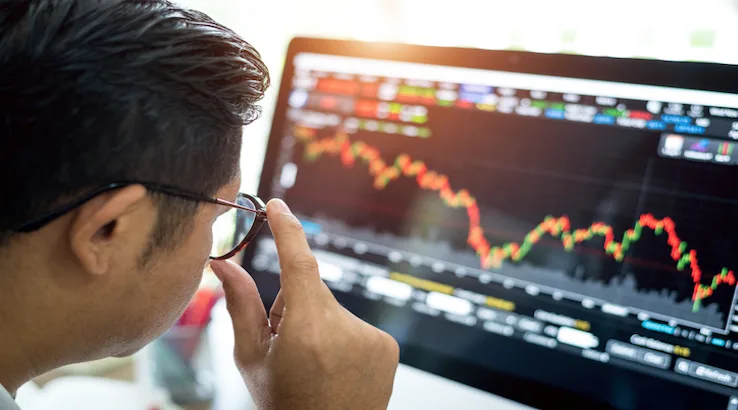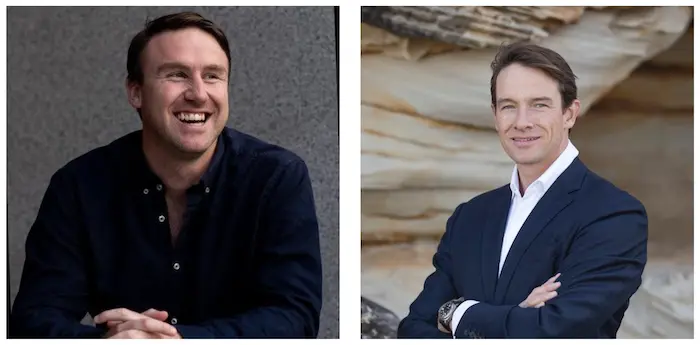What do stockbrokers and day traders actually do?

Industry veterans reveal what goes on each day in the world of high finance – and what The Wolf of Wall Street would look like if it were made today.
The Wolf of Wall Street launched into cinemas with an intoxicating depiction of high finance based on the morally corrupt boiler rooms of the 1980s and 90s, where brokers wheeled and dealed penny stocks to the unsuspecting.
Subsequent hits like The Big Short and TV show Billions swap the sleazy haircuts and phones for Bloomberg Terminals and monitors, yet the idea of high-octane traders yelling at screens and colleagues has stayed the same.
But what does a day in the world of high finance actually look like in Australia in 2020?
To get an idea of how things really operate, we got in touch with Tech FX Traders CEO and veteran day trader Tony Sycamore, ex-stockbroker Gary Huxtable and Holon Global investment analyst Mark Roddy.
They help us peek behind the curtain at what the world of hedge funds, day trading and institutional investment is really like. Plus, they share some valuable insights from the trading floor for investors looking to refine their strategy.

Mark Roddy and Tony Sycamore
What does an average day look like for you?
Gary Huxtable (ex-stockbroker): The day begins with a quick snapshot of overnight moves, before going through stocks on the watchlist. After going through the watchlist, you have then narrowed the list down further to an "at play" list. This list contains stocks of which it is possible to have buy signals that day as per your trading plan.
As a broker, the higher brokerage rate means trading intraday, or holding for even a few days is unlikely to be profitable for clients in the long run, so you're trading over a longer time frame. This means you can generally plan your day's trades within the first hour of the day, and submit the orders throughout the day.
As a broker, clients need to be called to submit orders. So, once identifying trade opportunities, you're spending the rest of the day on the phone.
Trading my own capital, paying lower brokerage rates and not having to call multiple clients to submit orders, I can be more precise with entries. If I have time to watch the market all day, I'll generally have the "at play" list going with a lower time frame chart, such as five minutes.... If I don't have such a luxury, I'll set up signals when certain price levels are hit or on stop orders.
After market close, it is time to complete a trade diary. This is to keep a record of any completed trades and even heavily considered trades that weren't actioned that day.
Tony Sycamore (day trader): I wake up early each morning to catch up on overnight market movements, news and other events that may have moved markets. I then read relevant bank research before scanning the charts of the dozen or so markets I trade.
Following this, I write and publish the technical reports that outline our main trading ideas to our members and put on any new trades that have caught my attention.
Once this is finished I generally get outside for some fresh air/exercise before returning to the screens at about 11.30am for another 3 or 4 hours to expand on any ideas from earlier in the day and provide additional market analysis to our members and clients.
After that I am on the move again before returning to the screens around 7pm, either to host trading educational webinars or to catch up on the day's events and market movements in Asia and in Europe. Sometimes that just involves adjusting stop losses and other similar adjustments to the existing trades that I have on, before I go to bed.
Mark Roddy (investment analyst): Typical day is usually looking at how the market performed overnight and a brief look at the news to see if there is anything relevant to our portfolio.
Most of my day is then spent researching a company or industry...In the initial phases of research, it's about gathering as much information as possible, so that might involve watching videos on the company/industry, reading reports etc.
From that, we can start to form questions that will help in accelerating our understanding of the business or how we might look at valuing it. If we can find the answers to the questions great, if not, then we try to find people to answer them... So we tend to talk to a fair few people as well, be that customers, industry experts, the companies themselves.
Other than this, if there are trades we need to make I will implement that and work with our accountants to ensure that we get the correct unit pricing of our fund.
What are you looking for when you scan the market?
Gary Huxtable (stockbroker): I'll be both looking for actionable setups, in addition to noticing what most stocks are currently doing around pivots, breakouts and base low tests. This gives you an idea of the current market conditions. In order for the market itself to go higher, individual stocks need to go higher and vice versa, so having an idea of the underlying price action of stocks, is often a better leading indicator of overall market performance than the index itself.
The actionable setups I trade are obvious when I see them. If they don't stand out straight away, I move on. There's no need to force trades.
Tony Sycamore (day trader): This is quite a complex question to answer succinctly but in a nutshell, I rely on my technical and macro analysis to provide me with high conviction trades in markets that crucially include an acceptable level of capital exposure.
It's all well and good having a strong view of markets, but if there isn't the right structure in place in terms of risk vs reward I won't take the trade.
Mark Roddy (investor): I try to stay away from looking at the market too much, although it is hard sometimes. It can be distracting without adding too much value to what I do. If I am looking, it's really trying to find stock ideas – what is moving, why is it moving etc.

What are your preferred methods for trading or investing?
Gary Huxtable (stockbroker): As an individual trader now, I play to my edge... Funds cannot enter and exit stocks quickly, however as an individual trader one can. My edge lies in being able to quickly get out of losing trades, and just as quickly sell into strength. Generally holding stocks for days or weeks at a time.
Fundamentals can be helpful, such as looking at P/E ratio vs growth expectations, competitive advantages etc. However fundamentals can also be a double-edged sword, as it leads to confirmation bias and can prevent you from sticking to disciplined risk management.
Tony Sycamore (day trader): My best trades are when my technical and macro analysis are in agreement. In terms of the blend here, my process is ~65% technical and 35% macro.
Mark Roddy (investment analyst): We use a discounted cash flow to value businesses, so for me it's finding the data in the annual reports, or if I'm looking at data that can't be found there, it's really anywhere I can find it on the Internet. It's just important that the source is reliable.
Are global events like the Great Recession as dramatic as Hollywood makes them look?
Gary Huxtable (stockbroker): Global events, such as those seen this year, are only dramatic if you don't have a plan for them. Unfortunately, most market participants' only plan is to panic sell, or simply hold and hope they return.
Bear markets are generally shorter and more brutal than bull markets, however other than the COVID-19 sell-off this year, and the 1987 crash, it's generally more of a slow burn.
Tony Sycamore (day trader): I was part of the proprietary trading team at Goldman Sachs JBWere in Sydney during the GFC. There were a few hairy days then however mostly we did very well both before, after and during this period.
Being at the coalface during the GFC, at a US bank during a US-centric financial crisis, I think the movies about that period were an accurate reflection of what exactly was going on. It was at times scary, exciting and everything in between!
Mark Roddy (investment analyst): I'm not sure how the GFC felt as I was still at university then but the sell-off we had in March was quite surreal. It was very fast and whilst we knew that for us this meant opportunity it is hard not to get caught up in the reality that recessions will hurt people. I'm not sure we are in the clear yet either.
Advice for retail traders or investors looking to take it up a notch?
Gary Huxtable (stockbroker): Have a trading plan and trade diary. Know exactly what your rules are for entry, exit and risk management. Also write down your beliefs about the market, and your edge. Your style needs to be congruent with your beliefs and lifestyle or you'll constantly sabotage yourself. Journal each day on trades taken and trades considered. This helps you refine your strategy and just as importantly your ability to stay disciplined and stick to it.
Trading is more about mastering yourself than any "holy grail" strategy.
Tony Sycamore (day trader): Private traders place trades way too big for their account size and generally don't employ sound risk management strategies. Also, there is a tendency to believe media hype that trading is "easy" when in reality, like most things we do, trading takes time to learn, patience and dedication.
Mark Roddy (investment analyst): Find an investor that you want to emulate and try to spend time with them. Learn from them – learn their processes. Ideally, one that has a history of outperforming.
Also, Australia is quite small in comparison to the rest of the world. There are opportunities globally; don't cut yourself off from them by only exploring one part of the market.
If Martin Scorsese were to make a Wolf of Wall Street about the industry in 2020, what would it look like?
Gary Huxtable (stockbroker): The next movie will likely depend on the outcome of the current central-bank-fuelled asset bubble. How and if we get out of this could throw up all sorts of movie narratives, e.g. were central banks given too much power and not enough accountability? Why were executives allowed to borrow at cheap interest rates, to buy back stock to push up their performance bonuses? Why was the head of the Federal Reserve attending parties with Jeff Bezos? These are the questions that need to be asked and stories that need to be told.
Tony Sycamore (day trader): The question is a bit of a tricky one because post-GFC a lot of new rules and regulations stamped out a lot of the cowboy behaviour. There is still probably some craziness out there, but not at all like it used to be. In that sense I have a feeling it would be quite a dull film compared to the earlier version.
Mark Roddy (investment analyst): Who knows? Maybe he just remakes Wolf of Wall Street but replaces the brokers with compliance consultants.
About our interviewees
Gary Huxtable is a former stockbroker of a major Australian investment firm and continues to trade his own capital privately. During his time in the industry, Gary was a prominent commentator for the likes of the AFR, The Australian and Wall Street Journal.
Tony Sycamore is a day trader and adviser, the CEO founder of Tech FX Traders, which specialises in FX, commodities and occasionally digital currencies (cryptocurrency). He's been in the industry for decades and was at the coalface of the Global Financial Crisis (GFC) in 2008 while working for Goldman Sachs JBWere in Sydney.
Mark Roddy is an investment analyst with Holon Global, which means rather than looking for trades on the daily charts, he is focused on finding investment opportunities for his fund's portfolio that will propel it in the long term.
Trade with IC Markets
Compare other CFD trading platforms here

More headlines
-
All the big savings account interest rate rises: ING, AMP, Westpac + more
6 Feb 2026 |
-
Australian credit card debt soars 10% in a year: How can you escape the trap?
6 Feb 2026 |
-
4 cashback home loan offers to ease the pain of RBA rate hike
4 Feb 2026 |
-
Finder’s RBA Survey: Easing cycle ends as RBA delivers first rate hike since 2023
4 Feb 2026 |
-
Ubank Save is increasing its bonus rate up to 5.35% p.a.
3 Feb 2026 |


